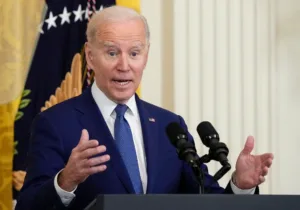As I argue in the first part of this two-part series, believing China’s rise is peaceful is delusional, though this is the conventional wisdom among globalists and their leftist fellow travelers (who never encounter a communist regime they don’t prefer to the United States). Both of these groups, whom I will refer to collectively (and charitably) as “idealists,” view China’s rise as largely beneficial and benign. The radical left also sees China as auguring a desirable alternative to the loathed, US-dominated “neoliberal” world order. But as the pandemic showed, the idealists are wrong. In this second part, I offer their counterargument and then demonstrate how they are wrong.
Idealists argue China’s increasing power—which President Xi Jinping’s ambitious dream amplified—will not result in a hegemonic war with the US because the likelihood of such a war is vanishingly small at this historical moment (which is somehow unique in their eyes). Why? Because these two powers are enmeshed in a web of unprecedented economic relations—and this simply makes war unbearable and unthinkable. China’s rise, the idealists conclude, therefore cannot result in a world war with the US.
They further assert or assume (never quite argue) that history’s real lesson—which even advocates of the “Thucydides Trap” thesis accept as true—is that hegemonic change doesn’t always involve war. While it is true, as Thucydides demonstrated, that the rise of Athens precipitated the Peloponnesian War, it is also true, the idealists remind us, that the rise of Spain in the late-fifteenth century did not trigger a war with hegemonic Portugal. The rise of the US in the early twentieth century did not spark a war with hegemonic Britain, either. Thus, they conclude, hegemonic change can take place without hegemonic war.
Further, the idealists remind us that unlike in most of the past cases of hegemonic war, the current geopolitical situation is pregnant with the possibility of genocide—not in the modern sense of the destruction of a people, but in the etymologically proper sense of the destruction of all people. According to this view, any such war today would inevitably involve the use of nuclear weapons. War between these two powers would thus result in unprecedented—even unimaginable—death and destruction for both countries. Therefore, we are assured, hegemonic war between the US and the PRC is simply impossible.
Finally, some idealists believe that the PRC does not need to formally assume the mantle of global hegemon in order to realize Xi Jinping’s ambitious “China Dream”—a dream that imagines a rejuvenated China as an influential, perhaps even predominant, power on the world stage. These goals can all be achieved without creating a new world order “with Chinese characteristics.” Indeed, as China’s leaders over the past few generations have learned, the PRC can flourish as a global great power without assuming the costs or responsibilities of global hegemony. One must conclude, therefore, that it is highly unlikely that the pursuit of Xi Jinping’s “China Dream” will result in a Chinese bid for formal preeminence that would lead to a major war with America.
These are all persuasive arguments. They are also dead wrong. To begin with, the idealist vision is based on a kind of myth-history. Actual history, for example, teaches us that high levels of economic interdependence do not preclude the possibility of systemic war. Levels of economic integration among Europeans were higher in 1914 than between the US and PRC today, and this didn’t prevent the rise of another aspiring hegemon seeking its “rightful place in the sun” from triggering a catastrophic world war. Contra the idealist, then, extensive economic integration is simply no prophylactic against hegemonic war.
Second, with respect to the claim that systemic war today would simply be too destructive to be rational, I would point out that the still-raw memories of the Great War should have made the prospect of a second world war simply unthinkable. Yet just over two decades after the Armistice was signed in 1918, the world was at war again. The takeaway: we cannot count on fear of even apocalyptic destruction to deter the outbreak of war—even war that might involve the use of nuclear weapons.
Finally, with respect to the argument that global hegemony is not geo-strategically necessary for the PRC, I would respond that it is nevertheless politically necessary for the Chinese Communist Party. Simply put, the Chinese leadership needs this victory over the US to cement the legitimacy of a regime that otherwise rests on wobbly foundations. Additionally, China’s rulers believe this outcome is historically foreordained in that global domination is the inevitable telos of China’s long history. The country sees itself as the pivot around which the world revolves, and Xi has revived this “Middle Kingdom Syndrome” with Mao Zedong Thought. Consequently, the PRC will continue, indeed intensify, its current strategic campaign to displace the United States as the hegemonic power on the world stage, which will result in war.
What about the claim that, for all the pearl-clutching over the supposed dangers a rising China poses, the PRC only aspires to play its natural role as a “responsible stakeholder” on the made-in-America global stage? Again, the ongoing pandemic exposed this to be more an idealist fantasy than an actual reality. Consider, for illustrative purposes, this far-from-exhaustive list of COVID-19-related disqualifying behaviors over the past several months: the suppression of news of a novel and deadly viral outbreak in Wuhan; the attempt to shift the blame for what subsequently (and needlessly) became a global pandemic to the US; the disingenuous provision of defective test kits, personal protective equipment (PPE), and medical equipment to nations in desperate need around the world; and, finally, the attempt to portray China’s draconian (to put it charitably) attempt to contain the virus within the PRC as a model for all. In all of these cases, the CCP pursued China’s national interests in total disregard for the global public interest. These are not the actions of a responsible stakeholder or a good global citizen. Quite the opposite: they reveal the narrowly self-serving character of the CCP’s foreign policy priorities and, perhaps more importantly, provide a foretaste of what kind of predatory hegemon China would be if not checked.
Three brief points by way of conclusion: First, all of this should matter to Christians. In the same way that a CCP-dominated China has made that county very inhospitable for Christians, so too a PRC-dominated global order would make the world very inhospitable for Christianity. Consider how the CCP first subordinated and then (under cover of COVID-19) effectively smashed the Catholic Church in China. Does anyone seriously question that such a fate awaits the global Christian community in a world order the PRC shapes and controls? If anyone doubts Christianity’s fate in such a world, he or she should consider what happened to fascism and communism in a world order the United States shaped and controlled. These “isms” simply no longer exist as meaningful historical movements. So if the PRC wins now, Christianity faces a grim future globally.
Second, given the idealist argument’s fatal flaws, I have to conclude that Thucydides was right—“the rise of Athens and the fear that this instilled in Sparta… made war inevitable”—and that the rise of China will also instill fear in the United States, making war between these two powers inevitable. Unless, that is, the US does something to avert the gathering storm.
This brings me to a critical question: What is to be done? In response, I offer the following Churchillian answer:
I am afraid that if you look intently at what is moving towards [the United States], you will see that the only choice open is the old grim choice our forbears had to face, namely, whether we shall submit or whether we shall prepare. Whether we shall submit to the will of a stronger nation or whether we shall prepare to defend our rights, our liberties and indeed our lives.
I obviously changed the referent of Churchill’s concern; I would never dream, however, of changing his wise counsel.





